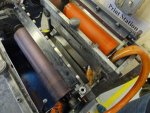Small Business Technical Assistance
Helping small business owners and operators understand and comply with environmental regulations.
The Small Business Technical Assistance Program (SBTAP) was established by NHDES in 1992 to provide small business owners and operators with free assistance to help them understand and comply with air and other environmental regulations. This confidential, non-regulatory program provides information about regulatory requirements and practical, cost-effective technical assistance to encourage compliance with oftentimes complex environmental regulations.
SBTAP meets these goals by providing the following services:
- Business and Industry Outreach.
- Environmental Compliance Assistance.
- On-site Assessment and Consultation Services.
SBTAP, in partnership with other public and private assistance providers, strives to ensure that businesses are operating in compliance with all applicable air and other environmental requirements and providing a safe workplace for their employees, all while maintaining and increasing their competitive edge.
In addition, the Small Business Ombudsperson provides proactive services to business owners to help them avoid unnecessary delays in permit issuance or penalties and fines for non-compliance. The Ombudsperson also represents the interests of small businesses in legislative and regulatory development, facilitates the resolution of complaints and disagreements between business owners and NHDES in a mutually-beneficial manner, and develops and facilitates education and outreach programs on specific regulatory compliance issues.

Auto Body/Collision Repair Compliance Assistance
Through compliance assistance and pollution prevention opportunities, SBTAP can help auto body, collision repair and restoration facilities to reduce emissions and waste, encourage compliance with environmental regulations, and create a healthier environment for workers and the state.

Environmental Assistance for printers
SBTAP can help printers to reduce emissions and waste, encourage compliance with environmental regulations, and create a healthier environment for workers and the state.
 Guidance for the wood finishing industry
Guidance for the wood finishing industry
The coating materials used to protect wood often contain a substantial amount of solvents that can volatilize to the air within the facility and/or are vented to the environment. To learn more about compliance assistance information and pollution prevention opportunities, including how to reduce emissions and generate less waste, contact SBTAP.
Did You Know?
Small Business Ombudsperson
The Small Business Ombudsperson acts as the small business community’s representative in matters that affect it under the Clean Air Act Amendments, Environmental Justice and other environmental issues.




